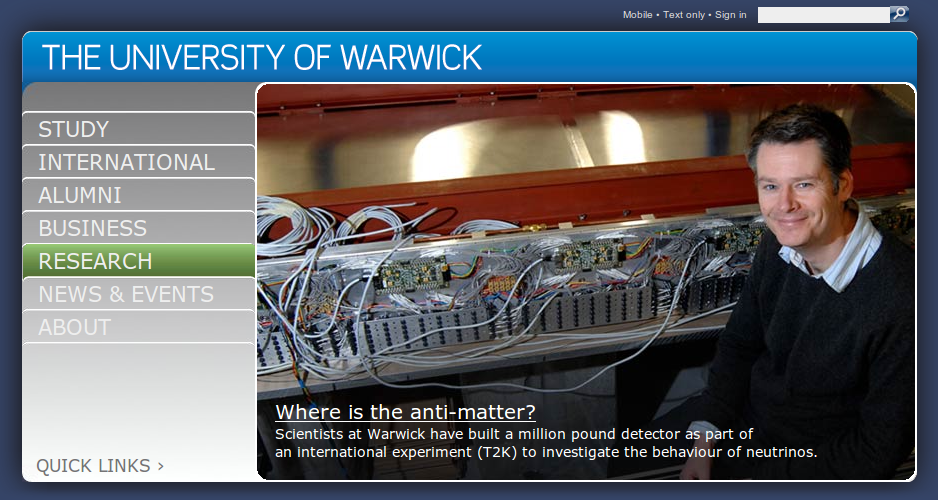T2K Latest News
First result gives hint of neutrinos changing!
The T2K experiment today released their first ever physics result which has also given us our first evidence of a previously unseen phenomenon.
The experiment studies the Universe's most mysterious particles, known as "neutrinos", which exhibit a behaviour known as "neutrino oscillations". There are three distinct types of neutrino (electron, muon and tau) but as they travel they can change back and forth from one to the other. So just because you had a muon neutrino to begin with, you might not have a muon neutrino later!
In T2K, an accelerator on Japan's East coast produces a beam of muon neutrinos, then fires them almost 300km through Japan to a detector at Kamioka. What the experiment has observed, for the first time, is a hint that some of those muon neutrinos are oscillating into electron neutrinos. With many experiments around the world racing to be the first to observe this effect, T2K's publication of this hint will be a significant result in the particle physics community.
Measuring such oscillations is a crucial step in our attempts to explain why the Universe is now made almost entirely of matter and not equal amounts of matter and anti-matter, as it was at the big bang: the biggest open question in particle physics.
If it were not for the devastating earthquake earlier this year, T2K would have most likely been able to confirm this result, instead of seeing just a hint, so all eyes will be watching for what happens when the experiment restarts in the near future!
If you'd like someone to comment on this significant result, Warwick's Dr Gary Barker and Dr Steve Boyd have been working on T2K for over 6 years.
- Read our description of T2K and its physics goals
- Download the paper
- Read the UK press release
- Read the Japanese press release (in English)
- Read the article on BBC news
T2K's First Paper Online
T2K's first paper as a collaboration is now available!
The 'first paper' is a significant milestone in a collaboration's history, marking a definite departure from construction and preparation into producing physics results.
The paper, which describes the experiment's construction and operation, will be published in the journal Nuclear Instruments and Methods next month. Until then you view it on the arXiV at the following address: http://arxiv.org/abs/1106.1238
Warwick has 9 authors listed on the paper including our technicians who were instrumental in our construction of the P0D ECal detectors.
T2K reaches milestone
During running last week the T2K experiment reached a notable milestone in its quest to study the elusive neutrino.
The T2K neutrino beam is made by colliding high-energy protons with a carbon target, and last week we reached 1020 (that's 100 billion billion) protons-on-target!
T2K's precision will ultimately be limited by the number of neutrinos it produces, so the experiment is continuing to push hard until the summer shutdown. Meanwhile the first papers from last year's data are in the final stages of approval.
This data run is also the first to include the P0D ECal detectors built here at the University of Warwick. Here's one contributing to the tracking of a cosmic-ray muon:
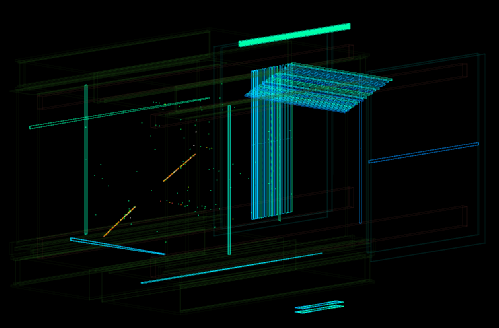
(The P0D ECal detector can be seen as the 6 green bars at the top)
Graduate students learn about T2K
Students at this year's SLAC Summer Institute were treated to a talk on the T2K experiment by Warwick's Dr Phill Litchfield. The talk covered all the requirements that T2K must meet and how they come together to make a world leading measurement of neutrino oscillations!
The SLAC Summer Institute is an annual summer school held at the Stanford National Accelerator Laboratory in California, USA. Students attend a mixture of lectures, tours, discussions and seminars.
To see the talk, you can download the slides from our T2K Resources page.
Construction Complete!
The Warwick EPP group are pleased to announce the completion of our final P0D ECal module!
Since October 2009 the group has been working hard to build and test six ECal modules destined for the T2K near detector where they will help investigate the mysterious phenomenon of "neutrino oscillations". The first three modules built at Warwick have already been installed in the detector, with the final three following them in September, ready for data-taking resuming in October.
The group is now looking forward to making equally significant contributions to the physics analysis, which will soon make T2K the world's leading neutrino oscillation experiment.
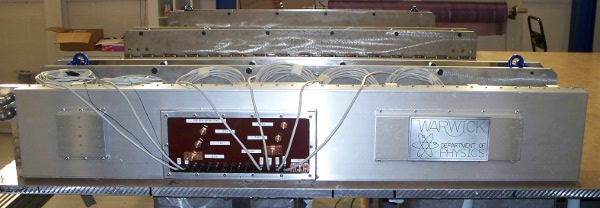
Five down... one to go!
We are pleased to announce the completion of the penultimate P0D ECal module!
For this, the second of the two larger modules, Warwick were also required to assemble the layers of lead and scintillator which make up the active part of the detector. Despite the more lengthy construction requirements everything is on schedule to complete all the modules in time for their September installation in Japan.
The group would like to thank Keith Briggs, a long-time technician at Warwick's Physics Department, who has been a key figure in this construction project and retired last week.
Meanwhile in Japan... the first three Warwick modules, belonging to the left-side on the near-detector, survived their journey are currently being installed.
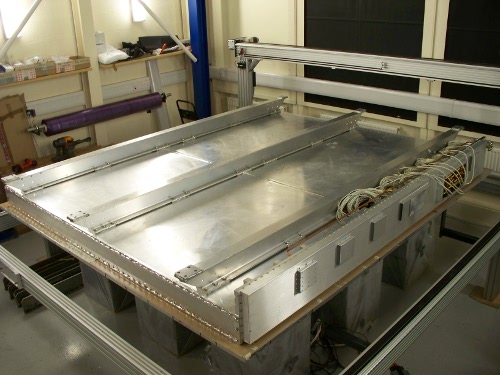
Another month, another module
Last week, all of the modules destined for the left-hand side of the magnet arrived on-site in Japan, ready for final checks before installation. But this latest module will have to wait before being shipped out: our T2K collaborators at the Rutherford-Appleton Laboratory are to run vital tests on some of the calibration hardware which will be used when the detector is in the experiment.
For now Warwick are moving on to the construction of the penultimate module: the Right-Side P0D ECal (which is almost twice the size of the smaller top/bottom ones).
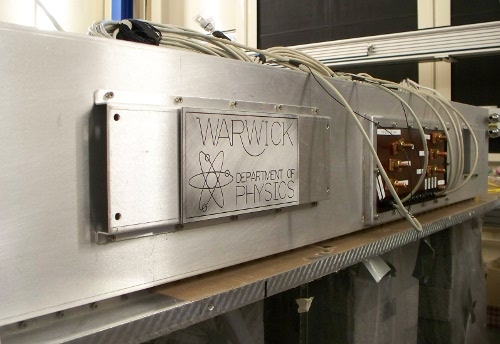
Half-way there!
On Monday 19th April Warwick shipped out the third completed detector module, representing the half-way milestone in our efforts to construct all of the "P0D ECal" Detector modules. These first three "left" modules will be installed during July.
But there's no waiting around... construction on the first of the modules destined for the "right" side of the detector is already well under-way to meet the installation deadline of early September.
Second Detector Complete!
The T2K group at Warwick University have now completed their second detector module! In total six "P0D ECal" modules will be built to aid in the detection of particles escaping from an inner detector known as the "P0D".
This (Top-Left) module will, along with our first, be installed during a service window early in the summer. Warwick now move on to the third (Bottom-Left) module, which will be the last module destined for the left side of the detector.
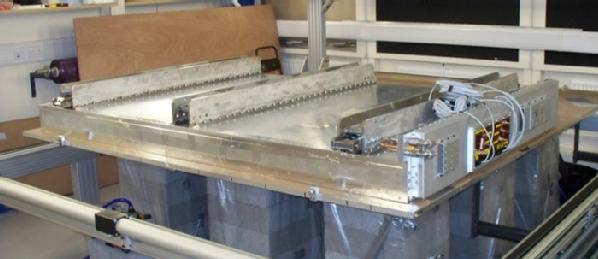
Front page news
T2K is today (22.01.2010) featured on the University's front-page with a corresponding news story covering the experiment and the work done at Warwick to construct the first of six P0D ECal detector modules. Read the news story.
